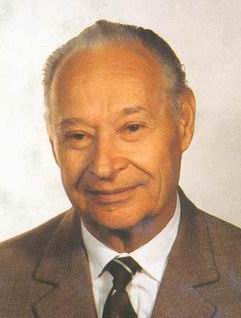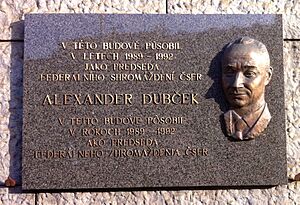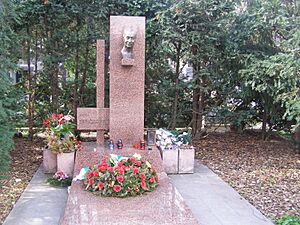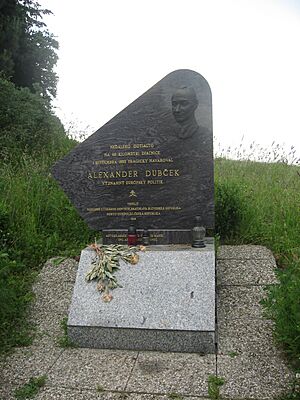Alexander Dubček facts for kids
Quick facts for kids
Alexander Dubček
|
|
|---|---|

Alexander Dubček
|
|
| First Secretary of the Communist Party of Czechoslovakia | |
| In office 5 January 1968 – 17 April 1969 |
|
| Preceded by | Antonín Novotný |
| Succeeded by | Gustáv Husák |
| Chairman of the Federal Assembly of Czechoslovakia | |
| In office 28 December 1989 – 25 June 1992 |
|
| Preceded by | Alois Indra |
| Succeeded by | Michal Kováč |
| In office 28 April 1969 – 15 October 1969 |
|
| Preceded by | Peter Colotka |
| Succeeded by | Dalibor Hanes |
| Personal details | |
| Born | 27 November 1921 Uhrovec, Czechoslovakia (now Slovakia) |
| Died | 7 November 1992 (aged 70) Prague, Czechoslovakia (now Czech Republic) |
| Political party | Communist Party of Slovakia (1939–1948) Communist Party of Czechoslovakia (1948–1970) |
| Signature |  |
Alexander Dubček (born 27 November 1921 – died 7 November 1992) was a Slovak politician. He was the leader of Czechoslovakia from January 1968 to April 1969. During this time, he tried to make the communist government more open and free. This period is known as the Prague Spring. However, he was forced to step down after the Soviet Union and its allies invaded in August 1968.
Under Dubček's leadership, Czechoslovakia aimed for "Socialism with a human face". This meant they lifted censorship on media and allowed more freedom in society. This led to a creative time in film and culture. But, leaders in the Soviet Union worried that Czechoslovakia was becoming too Western. They feared it would break away from Soviet influence. So, Soviet-led countries invaded on August 20–21, 1968. This invasion quickly ended the Prague Spring. Dubček had to resign in April 1969. He was replaced by Gustáv Husák, who reversed many of the reforms. Dubček was removed from the Communist Party in 1970.
Years later, during the Velvet Revolution in 1989, Dubček became an important figure again. He served as the head of the Czechoslovak parliament. He also received the Sakharov Prize from the European Parliament that same year.
Contents
Early Life and Beginnings
Alexander Dubček was born in Uhrovec, Czechoslovakia (now Slovakia). This was on November 27, 1921. When he was three, his family moved to the Soviet Union. They wanted to help build a socialist society. They also sought jobs, which were hard to find in Czechoslovakia. He grew up on a farm commune in what is now Kyrgyzstan. In 1938, his family returned to Czechoslovakia.
During World War II, Dubček joined the underground resistance. He fought against the pro-German Slovak state. In August 1944, he fought in the Slovak National Uprising. He was wounded twice during this fight. Sadly, his brother, Július, was killed.
His Political Journey
After the war, Dubček joined the Communist Party of Slovakia. This party later became part of the Communist Party of Czechoslovakia. He slowly moved up in the ranks of the Communist government. From 1951 to 1955, he was a member of the National Assembly. This was Czechoslovakia's parliament. In 1953, he went to a political college in Moscow. He graduated in 1958.
He became a key leader in the Slovak branch of the party. In 1963, he became the First Secretary of the Slovak branch. This meant he was the top leader for the Communist Party in Slovakia. Under his leadership, Slovakia started to become more politically open. Slovak identity was also promoted more. This included celebrating Slovak history and culture. People in Slovakia also had more freedom to express their ideas. This was more than in the Czech parts of the country.
The Prague Spring Reforms
In the 1960s, Czechoslovakia's economy was struggling. Many people were unhappy with the strict central control. In October 1967, reformers like Dubček challenged the leader, Antonín Novotný. Novotný was facing a rebellion within the party. He invited the Soviet leader, Leonid Brezhnev, to Prague. Brezhnev came in December 1967. He saw how much opposition Novotný faced. Brezhnev decided not to interfere. This led to Novotný's resignation.
Dubček was seen as a safe choice by the Soviet Union. He had lived and studied in Russia. On January 5, 1968, Dubček became the new First Secretary. This marked the start of the Prague Spring.
What Was the Prague Spring?
During the Prague Spring, Dubček and other reformers wanted to make communism more humane. They called it "socialism with a human face." They aimed to reduce the party's harsh control. Dubček still believed in Communist rule. But he wanted to make it more popular. They allowed more freedom of speech. They also tolerated groups not controlled by the Communist Party. People chanted "Dubček! Svoboda!" (Svoboda was the President). A poll showed 78% public support for Dubček.
However, Dubček faced a difficult situation. The reforms gained speed, and people wanted even more freedom. At the same time, hard-line Communists in Czechoslovakia and other Warsaw Pact countries pressured him. They wanted him to stop the reforms. Dubček wanted to slow things down. But he refused to use harsh methods. He still stressed the party's leading role. He also emphasized loyalty to the Warsaw Pact.
The Soviet leaders tried to stop the changes. They held talks with Czechoslovakia in July. Dubček tried to assure them he was still friendly to Moscow. He argued that the reforms were an internal matter. He believed the Kremlin would let him make changes at home. This was as long as Czechoslovakia stayed loyal to the Soviet bloc. But Brezhnev and other leaders were still worried. They feared that a free press could end one-party rule. This could spread to other Eastern European countries.
The End of the Prague Spring
On the night of August 20–21, 1968, armies from several Warsaw Pact countries invaded Czechoslovakia. Albania, Romania, and East Germany did not join the invasion. The armies quickly took control of Prague. They arrested Dubček and other reformers. Before his arrest, Dubček asked people not to fight back. He said military defense would cause a "senseless bloodbath." Later, Dubček and others were taken to Moscow.
The people of Czechoslovakia resisted without violence. They changed street names and road signs. They pretended not to understand Russian. They put up funny posters. Radio stations called for the invaders to go home. This non-violent resistance delayed the takeover for eight months. But the reformers were forced to agree to Soviet demands. They signed the Moscow Protocol. This officially ended Dubček's Prague Spring.
Dubček and most reformers returned to Prague on August 27. Dubček kept his position until April 1969. The reforms of the Prague Spring were not reversed at once. It happened slowly over several months.
In April 1969, Dubček was forced to resign as First Secretary. He was then made chairman of the Federal Assembly. Later, he was sent as an ambassador to Turkey. In 1970, he was expelled from the Communist Party. He lost his seat in both the Slovak and Federal parliaments.
Life as a Private Citizen
After being removed from the party, Dubček worked in the Forestry Service in Slovakia. He remained popular among the people he met. He used his good reputation to get rare materials for his workplace. Dubček and his wife, Anna, lived in a comfortable home in Bratislava.
In 1988, Dubček was allowed to travel to Italy. He accepted an honorary degree from the University of Bologna. While there, he gave an interview to an Italian newspaper. This was his first public statement since 1970. His appearance helped him become known internationally again. In 1989, he received the annual Sakharov Prize.
The Velvet Revolution
During the Velvet Revolution in 1989, Dubček supported the movement for change. On November 24, Dubček appeared with Václav Havel on a balcony. They looked over Wenceslas Square. Protesters cheered loudly for Dubček. They saw him as a symbol of freedom. Some even chanted, "Dubček to the Castle!" (meaning, Dubček for President). He told the crowd that the revolution was a chance to fix what was wrong with communism. Later that night, the entire Communist Party leadership resigned. This ended Communist rule in Czechoslovakia.
Dubček was elected Chairman of the Federal Assembly on December 28, 1989. He was re-elected in 1990 and 1992. He saw the Velvet Revolution as a win for his idea of humanistic socialism. In 1990, he received the International Humanist Award. He also gave a speech at The American University in Washington, D.C. This was his first visit to the United States.
In 1992, he became the leader of the Social Democratic Party of Slovakia. He supported keeping Czechs and Slovaks together in one country. However, the country eventually split into independent Czech and Slovak states.
Dubček's Passing
Alexander Dubček died on November 7, 1992. He passed away from injuries from a car crash. The accident happened on September 1, 1992, on a highway in the Czech Republic. He was buried in Slávičie údolie cemetery in Bratislava, Slovakia.
Legacy and Cultural Impact
In 1984, French singer Alice Dona released a song called Le Jardinier de Bratislava. It was about love and wanting freedom. The song was inspired by a French TV crew trying to visit Dubček. They were not allowed to see him. The only video they got was of him working in his garden.
A movie called Dubček was released in 2018. It is a Slovak historical film. The main story is about the events of the Warsaw Pact invasion.
|
See also
 In Spanish: Alexander Dubček para niños
In Spanish: Alexander Dubček para niños
 | William M. Jackson |
 | Juan E. Gilbert |
 | Neil deGrasse Tyson |




